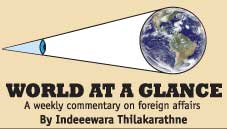|

Bloody traces of massacre seen in village
A BBC correspondent has seen evidence of human remains at the village
of Qubair in Syria, scene of a massacre reported on Wednesday. Paul
Danahar, who was travelling with UN monitors, found buildings gutted and
burnt in the deserted tiny village near the western city of Hama. It is
unclear what happened to the bodies of dozens of reported victims.
Violence continued across Syria, with unconfirmed reports of explosions
in the capital Damascus.
The Red Cross has warned that 1.5 million people need humanitarian
aid. Condemning the Qubair massacre earlier, UN Secretary General Ban Ki
moon warned of an imminent danger of civil war and the international
peace envoy, Kofi Annan, has said his six point peace plan is not being
implemented.
The opposition blamed the Qubair massacre on militia allied to
President Bashar al-Assad while the government accused "terrorists" of
killing civilians. UN monitors reached Qubair on Friday, with Paul
Danahar accompanying them, after coming under fire while making an
initial attempt on Thursday. 'Burnt flesh' People in the area told the
UN team that everybody in Qubair "had died except for a few", UN
spokeswoman Sausan Ghosheh told BBC News after visiting the village.
She said that the UN had not yet been able to establish the number of
people dead or missing and were trying to compile a list with the help
of local people. According to Ms Ghosheh, one house in Qubair seemed to
have been hit by tank rounds as well as weapons of different calibres,
including small arms.
A second house, she said, had "burnt flesh inside and... a stench of
burnt flesh". Activists say government forces removed many of the bodies
from Qubair but a number are said to have been buried in the nearby
village of Maarzaf.
The opposition Syrian National Council gave a death toll of 78 but
another organisation, the UK-based Syrian Observatory for Human Rights,
has a figure of "at least 55". State media gave a figure of nine.
The militiamen accused of the killings at Qubair are known as
shabiha, and are mainly from the minority Alawite community of President
Bashar al Assad. The Alawites are a heterodox offshoot of Shia Islam.
The victims appear to be mostly Sunni Muslims, who make up the majority
of the population.
Euro crisis Germany's obstinate chancellor Angela Merkel, swimming
instructor
When it comes to the euro, the German chancellor prefers self-help to
help but she can be more flexible than she seems When warnings sound
that the end of the euro is nigh, all eyes turn to Angela Merkel, the
German chancellor. Germany must "assume its part" in saving the
currency, says Spain's economy minister, Luis de Guindos.
If there is rescuing to be done, Germany is the obvious rescuer. Yet
rather than toss out the lifebelt, Merkel offers swimming lessons. She
would find this characterisation unfair. Time and again she has taken
stands against bail outs only to relent. She balked at bailing out
Greece and at a permanent rescue fund and she vetoed the use of bail out
money to buy government bonds in the secondary market. In each case she
gave in.
By July she will push through parliament the European Stability
Mechanism (ESM), the permanent fund she once opposed, and Europe's
fiscal compact. Germany's capital contribution to the ESM will push its
budget deficit from €26 billion ($32 billion) to €35 billion. Germany's
potential liability, if all the money is lent and everyone defaults,
could be €280 billion. But her partners want more: Eurobonds backed by
all countries, more time for weak economies to meet deficit-reduction
targets, direct lending to Spanish banks and a "banking union", with
Europe-wide deposit insurance. Will Mrs Merkel yield on these, too? Do
not count on it.
Pakistan bus bombing: At least 18 killed near Peshawar
At least 18 people have been killed in a bomb attack on a bus
carrying government employees in north west Pakistan. The vehicle is
said to have been taking the workers to their offices when it was hit on
the outskirts of the city of Peshawar. At least 34 people are also
thought to have been injured in the incident. Peshawar lies near
Pakistan's lawless tribal belt - a stronghold of Taliban and al-Qaeda
militants. Hundreds have died in attacks in and around the city in
recent years. No group has so far said it carried out the latest attack,
but it comes a day after a bomb killed at least 15 people in the
Pakistani city of Quetta.
|

